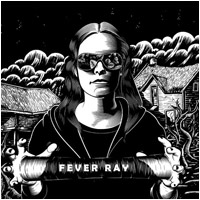
Jigsaw
Midget
Sprung from Britain’s grime circuit, Lady Sovereign emerged as a brash mix of cockney tongue lashing and feminine wiles with her Vertically Challenged EP in 2005. Less than a year later she had signed to Island/Def Jam, who promptly tried to position her as the hip-hop equivalent to Gwen Stefani’s punk-lite diva, smoothing out many of the ripples—even from songs on the EP—that made her so charismatic in the first place for her full-length debut, Public Warning. The roguish MC meanwhile was just trying to get to the next show on time after late nights of excess. So despite 300,000 records sold, and although Sovereign served as something of a precursor to M.I.A. and Santigold, it was a partnership not made to last.
And so Jigsaw, the Lady’s new LP, is on her own imprint, Midget Records (with distribution from EMI), and takes more of the erratic approach that at least I was hoping for from the first record. “Let’s Be Mates” begins the record with a bhangra beat, Sovereign delivering what might be the closest she gets to a love song. Meanwhile, the record’s title track goes the opposite direction, with the MC drowning her sorrow on a tweaky wave of romantic guitar-pop. “My heart is like a jigsaw puzzle” isn’t the most creative metaphor, but it’s revealing in a song more about having “too much drink.” And “I Got You Dancing” is a return to form of sorts, a grimy beat splintered by Sovereign’s tommy gun stream of syllables, while “I Got the Goods” takes a similar tack to close the record with fitting braggadocio. But it’s “So Human” that is the record’s tour de force. Lifting the beat, keyboard line and refrain from the Cure’s “Close to Me,” Sovereign comes off playful, vulnerable and brazen all at once. With Jigsaw, our cocky heroine has gotten all the pieces together to be both an artistic and commercial success.
Stephen Slaybaugh

Fever Ray
Mute
For many, the Knife’s 2006 album, Silent Shout, crafted a genre unto itself. The Andersson siblings forged a sub-set of electronica that relied as much on minimalism as it did the psychosomatic imagineering of the listener. Interpretations varied, but a common ground could be found in this icy clutch on modern dance music and the negative space of the avant-garde. Regardless of a name or a definition, the record willfully inspired visualization, enough so that films were created to accompany the songs’ motley shades.
While that was some time ago, it’s hard to fault the duo for their absence when the art they create is as abundantly rich and intriguing as their catalog thus far. Fever Ray, the first solo foray for Karin Dreijer, the Knife’s tundra diva, is not that far removed from what has been done in the past in respect to the tonal quality of the group’s work. It’s the lack of a cyclical rhythm that presents the distinction here and that departure towards an even deeper, darker, more insular environment is both exotic and austere. “If I Had a Heart” and “Now’s the Only Time I Know” present this linear direction for Dreijer, in so much as she’s telling stories about “dishwasher tablets” and “cucumbers on her eyes” with no real middle or end, chorus or bridge.
Much of the sonic landscape presented on this self-titled debut could be attributed to the sound of new age—soft haunting bells, pitched synth waves, tribal echoes—or to the outer crevices explored by Mike Oldfield (and to a lesser degree, even Enigma). Dreijer seems to be emitting from the forest that sits far an away from the winter fortress built by the Knife. But what’s most striking is her voice, especially when tuned low as a robotic dark lord on “Concrete Walls.” It’s one of singularity and strangeness that could only be rivaled by an artist like Björk or Kate Bush, and like their fantasy visions, Dreijer uses little else to traipse through a world that is all her own.
Kevin J. Elliott

The Proper Sex
The Social Registry
Legend has it that the first I.U.D. was a dagger used by a slave of Genghis Khan. She inserted it hilt first, not exactly to prevent pregnancy, but to mortally wound the Mongolian marauder. The modern I.U.D. is an ingenious gadget, a sexy gadget. Fittingly, I.U.D. the duo—Gang Gang Dance’s Lizzi Bougastos and Sadie Laska from Growing, among other art explosions—is gadget noise, fuck-sexy mongoloid gadget noise. The sticker on the front of the record (yes, I bought it because it is that good) will tell you that I.U.D. is a collaboration between two people, and the photograph on the front will corroborate this for you. However, when you listen to the actual disc, you will discover that this cannot be the whole story. Inside is a poster of a third member. It is a tall, My Lil’ Pony-haired, naked, female centaur, with a hacked-off donkey face for a head and cut-out Dentyne model lips for a mouth, that thinks in Mandelbrot fractals. The shaken-baby voice of this porno beast floats through the record, popping up at intervals, climaxes, in the background, under the sludge mimicking incidental Nirvana guitar squeals, even right out in front and almost in English.
The Proper Sex is TSS for your stereo, part metal chug-guitar, part synthetic drum dirge and part lover’s aid, layered and minimalist, engaging and disturbingly listenable. The beats clamber and bash, pitch shifting slower and slower then back to normal, but somehow manage to elicit a genuine groove. Imagine a Lizzy Mercier Descloux and Yoko Ono duet over the looped beginning of Nirvana’s “Paper Cuts,” dripping in blood and meconium, with the bass guitar through a delay pedal feeding back in the other end of a Church of Satan. Play this record at top volume and hope you never meet that porno beast.
Michael P. O’Shaughnessy

O+S
Saddle Creek
O+S (short for Orenda Fink, of Azure Ray, and Scalpelist, a.k.a. Cedric LeMoyne of Remy Zero) began as an art project at Omaha’s Bemis Center of Contemporary Arts, where Fink held a residency. She had begun collecting sounds and recruited LeMoyne, a friend from her hometown of Birmingham, Alabama, to assist in creating loops from them. Eventually such work led to the creation of this self-titled record, but by that point the two had parted ways, and thus it was made piecemeal through the mail.
With Fink having a collection of recordings from Haiti, as well as less exotic locales like Nebraska in Alabama, this project had the making of something exceptional and peregrine, or at least as interesting as any of the records Damon Albarn has made in his spare time. As it is, O+S seem less willing to explore the inherent qualities of the recordings they had at their disposal but rather to bend them to their owns wills and visions or bury them under a pall of trite mood music. “New Life,” which leads the record off is a catchy song, though it’s hard to hear any field recordings aside from the slight ambient embellishment, and “Permanent Scar,” which follows, is jarring for its fuzzed bass line hook, though what bearing any of the aforementioned back story had on it isn’t clear. Most of the remainder of the record never manages to escape falling back on terrain familiar to Fink from her Azure Ray days, or for that matter, to raise a pulse. “Haunts” is another exception, with a trip-hop texture and a whir of percussive touches, but O+S’s multi-culti cut-and-paste is an afterthought and not the raison d’etre that one is led to believe.
Stephen Slaybaugh
MP3: “Permanent Scar”

Fuckbook
Matador
With Fuckbook, Yo La Tengo have designated themselves as indie rock’s premiere leisure band. For more than two decades, they haven’t so much as broken the rules as they’ve made their own rules to follow. Their release schedule has no rhyme or reason, they can tour at a moment’s notice anywhere in the world, and when they do, it’s hard to complain about the show, be it a set full of guitar freak-outs or an hour and a half of chilled lullaby. As a symbol of a career built on quality, Yo La Tengo needs to be Yo La Tengo with no strings attached. That said, any band other than the Hoboken trio would have a hard time perpetuating the myth of the Condo Fucks, Yo La Tengo’s alter-ego to which Fuckbook is credited.
Yo La Tengo could get away with releasing an album’s worth of covers—they did so with 1990’s Fakebook—but it wouldn’t be as raw and youthful as it is as the Condo Fucks. Supposing Ira Kaplan is here returning to his roots, the most playful of the bunch pay homage to Richard Hell and the Electric Eels on recordings where overdubs and fidelity are of little importance. Scuzzed-up versions of the Small Face’s “What’cha Gonna Do About It” and the Troggs’ “With a Girl Like You” further prove that Yo La Tengo can be an unhinged garage band when given the proper space, and under the guise of the Condo Fucks, Kaplan is given free reign to let loose. Yo La Tengo fans will either politely pass on such a one-off goof of an album or patiently wait for the next proper full-length to emerge from the ultimate leisure band in America. Just don’t make us wait another two years, or your vacation time is over.
Kevin J. Elliott
MP3: “What’cha Gonna Do About It”

Stax: The Soul of Hip-Hop
Stax
There’s no denying the 600-pound gorilla influence that Motown Records has had on music and on popular culture. Motown is such a part of the fabric of history, it’s easy to dismiss or just plain forget about the other monster R&B label of the time. For those who liked their sounds a little less polished, the Memphis-based Stax Records was home to its own potent arsenal of hitmakers. But while Hitsville U.S.A. managed to hold on and solidify its legend, Stax burned out before eventually closing in 1975. While the music never went way, the name just didn’t have that kind of cache. Then, in 2004, Concord Records gained the rights to the 1968–1975 catalog (Atlantic Record still owns the rights to the 1959-68 recordings that they distributed), and re-launched the label as both an archive and active label.
One of the ways Concord is trying to re-establish their version of Stax is the release of a series of CDs highlighting Stax’s forgotten contributions to pop culture. This year’s model is Stax: The Soul Of Hip-Hop, a record that showcases its sample fodder for some of hip-hop’s biggest hits. It seems like a pretty no-brainer plan. Hip-hop is one of the biggest genres on the planet, so at the very least there’s a built in audience who’d like to hear where the producers got the original sounds.
The problem is that this record is almost 15 years too late. The songs that featured the samples—tracks from such artists as Big Baddy Kane, Eric B & Rakim and LL Cool J—are less likely to be heard on the radio than the original artists. And sample laws and culture have changed so drastically that the type of hip-hop Stax seeks to align itself with is almost like taking a gramophone to a Daft Punk concert.
But outside of the unfortunate marketing angle, the record is packed with forgotten classics and relative obscurities by artists such as Isaac Hayes, Ruffin Thomas and 24 Carat Black that soul and R&B fans will welcome as they reacquaint themselves with a classic label.
Dorian S. Ham
ALBUM REVIEWS
Harlem Shakes, Technicolor Health
Obits, I Blame You
Winter Gloves, About a Girl
Strange Boys, And Girls Club
Lotus Plaza, The Floodlight Collective
MSTRKRFT, Fist of God
Bonnie "Prince" Billy, Beware
Red Fang, Red Fang
Casiotone for the Painfully Alone, Advance Base Battery Life
Handsome Furs, Face Control
Tune-Yards, Bird-Brains
Mirah, (A)Spera
Chirs Cornell, Scream
Julie Doiron,
I Can Wonder What You Did With Your Day
